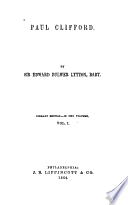Lucretia, Part II, Chapter XII
Context: The most useless creature that ever yawned at a club, or counted the vermin on his rags under the suns of Calabria, has no excuse for want of intellect. What men want is not talent, it is purpose,—in other words, not the power to achieve, but the will to labour.
Works

Richelieu
Edward Bulwer-Lytton
Eugene Aram
Edward Bulwer-LyttonThe Lady of Lyons
Edward Bulwer-LyttonFamous Edward Bulwer-Lytton Quotes
“Beneath the rule of men entirely great,
The pen is mightier than the sword.”
Act ii, Scene ii. This is the origin of the much quoted phrase "the pen is mightier than the sword". Compare: "Hinc quam sic calamus sævior ense, patet. The pen worse than the sword", Robert Burton, Anatomy of Melancholy, Part i. Sect. 2, Memb. 4, Subsect. 4.
Richelieu (1839)
Edward Bulwer-Lytton Quotes
Kenelm Chillingly : His Adventures and Opinions (1873), Book I, Ch. 8.
“A good heart is better than all the heads in the world.”
The Disowned (1828), Chapter xxxiii.
Probably the most parodied and ridiculed opening line in literature. It is the inspiration for a satirical prize, the Bulwer-Lytton Fiction Contest. Used by Charles M. Schultz in the Peanuts cartoons.
Paul Clifford (1830)
“Truth makes on the ocean of nature no one track of light — every eye looking on finds its own”
Caxtoniana: Hints on Mental Culture (1862)
Last of the Barons (1843), Book v, Chapter i.
“The easiest person to deceive is one’s own self.”
The Disowned (1828), Chapter xlii.
“Fate laughs at probabilities.”
Eugene Aram (1832), Book i, Chapter x.
Kenelm Chillingly; His Adventures and Opinions (1873).
“In the lexicon of youth, which fate reserves
For a bright manhood, there is no such word
As "fail."”
Act iii, Scene i.
Richelieu (1839)
Caxtoniana: Hints on Mental Culture (1862)
“The man who smokes, thinks like a sage and acts like a Samaritan.”
Night and Morning (1841), Chapter vi.
The Lady of Lyons (1838), Act v, Scene ii.
The Lady of Lyons (1838), Act ii, Scene i.
“The magic of the tongue is the most dangerous of all spells.”
Eugene Aram (1832), Book i, Chapter vii.
Source: The Coming Race (1870), Chapter 1. This is the origin of the phrase "pursuit of the almighty dollar". Washington Irving coined the expression almighty dollar itself.
“The brilliant chief, irregularly great,
Frank, haughty, rash,— the Rupert of debate!”
The New Timon (1846), Part i. In April, 1844, Benjamin Disraeli thus alluded to Lord Stanley: “The noble lord is the Rupert of debate.”
“Our glories float between the earth and heaven
Like clouds which seem pavilions of the sun.”
Act v, Scene iii.
Richelieu (1839)
Caxtoniana: Hints on Mental Culture (1862)
Quoted by H.P. Blavatsky, Isis Unveiled, Part One, Science, Ch. 1 (1877)
Zanoni (1842)

